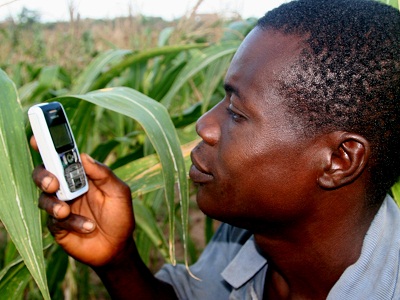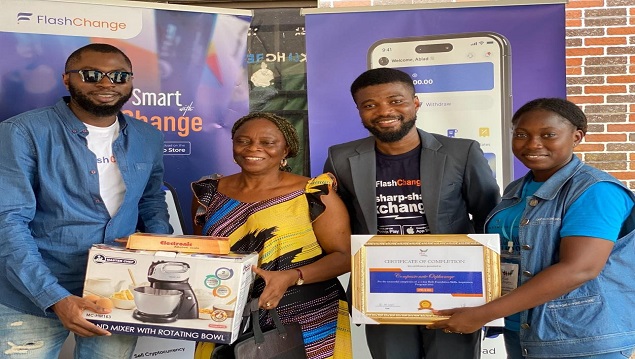General News
ICTs Set to Transform Smallholder Farming

Smallholder farming, which is the backbone of many African economies, is set to be transformed by a combination of investment and increasing access to information and communication technologies (ICTs), particularly mobile phones.
The claim was made Tuesday by Michael Hailu, director of the Technical Centre for Agricultural and Rural Cooperation (CTA) at ICT4Ag, a major conference on ICTs in agriculture.
“On this continent, 65 per cent of the workforce is employed in agriculture and the sector generates 32 per cent of GDP. Smallholder farmers, mostly women, produce 80 per cent of Africa’s food. African countries spend up to $50 billion a year on food imports. With abundant land, water and cheap labour, there is no good reason why Africa should import so much food.
“Yet there’s good reason to be optimistic. After years of neglect, governments and the private sector are increasing investments in agriculture. Nevertheless, to achieve its full potential, smallholder agriculture must be transformed from a subsistence activity to a profitable, sustainable business. ICTs play a vital role in this transformation. They provide timely advice and information. They help farmers increase productivity. They make markets more efficient. And they increase incomes along the value chain”.
The CTA Director said, “the phenomenal growth in the number of mobile phone subscribers in Africa in recent years shows that change was on the way. In 2000, there were just 16.5 million mobile subscriptions in Africa. Now, there are over 650 million. Indeed, the number of people on the continent with access to mobile phones exceeds the number with access to clean water, electricity or a bank account”.
Mr Hailu was speaking at ´ICT4Ag: The Digital Springboard for Inclusive Agriculture´ Conference, which is being organised by CTA, the Rwandan Ministry of Agriculture and Animal Resources (MINAGRI) and the Ministry of Youth and ICTs (MYICT).
The conference is taking place in Rwanda, a country where 80 per cent of the working population are employed in agriculture but where the government of President Paul Kagame has also invested heavily in agriculture and ICTs as part of its ‘Vision 2020’ agenda to turn Rwanda into a middle-income country.
Last week, the Rwandan Government announced that a new network will provide high-speed broadband access to 95 per cent of the country’s population within three years.
Rwandan ministers attending the conference shared the upbeat mood. Dr. Agnes Matilda Kalibata, Rwanda’s Minister of Agriculture and Animal Resources, reminded the audience of the significance of agriculture in poverty reduction: “Agriculture is a low hanging fruit for poverty reduction. With 40 – 65% employment in this sector in ACP Countries, any investment will have a huge impact on the economy”.
She also emphasized the importance of ICT in transforming agriculture.
“Rwanda has committed to transforming the country through ICT. Information and communication technologies (ICTs), social media, Web 2.0 and mobile applications are changing the face of agriculture and rural development in many countries. The use of mobile devices is transforming the communication landscape through dissemination and sharing, and is changing the way we do business. This conference presents an opportunity for participants, Rwandans in particular, to harness the use of ICTs in agriculture and is very much in line with the national vision of making Rwanda an ICT hub in the near future”.
Participants at the ICT4Ag conference – including agricultural experts, farmers, young innovators, ICT companies and government officials – are focussing their attention on improvements to agriculture that can be brought about by technological innovation, capacity building and creating enabling policies and infrastructure.
Key issues for discussion are the role of youth and the encouragement of entrepreneurship; the inclusion of farmers in decision-making, information and crowdsourcing; and connectivity.
The Hon Jean Philbert Nsengimana, minister of Youth and ICT of Rwanda, said: “This day is a culmination of more than 10 years of consistent investments in ICT4D policy and strategy formulation, infrastructure development, mobile penetration, education and value added services development in parallel with agriculture modernisation efforts”.
Ambassador Valentine Rugwabiza, CEO of the Rwanda Development Board, also a Cabinet member, highlighted the synergies between ICT and investment and also emphasised that indeed ICT is only a tool whose importance will be derived from how well it is used.
Michael Hailu stressed, however, that a major part of the key to securing the potential benefits of ICTs and investment in African agriculture was likely to be the extent to which countries are successful in harnessing the creative input of two key sectors: young entrepreneurs and women.
“Access to ICTs is not uniform”, he said, “and there is a digital divide. There is a significant gender imbalance, with men having better access to ICTs than women. And rural areas are significantly underserved compared to cities”.
He described the importance of young people as “pivotal”.
“Young people have the greatest aptitude for using ICTs, whether it’s to communicate or develop new apps to improve agricultural productivity or access faraway markets. Africa’s youth must therefore play a pivotal role in the transformation of smallholder agriculture.
“ICTs – in particular mobile devices – have opened up unprecedented opportunities for agricultural and rural development. This development can offer a bright future for millions of women and men who derive their livelihood from farming and other forms of rural employment. Farmers, even in the remotest locations, can easily and readily access vital information on weather, market prices, pests and diseases as well as input prices.
“It is not just about linking farmers to markets or creating employment opportunities for young people. Social media also provide a platform for rural communities to contribute to policy-making”.
More than 500 participants from 63 countries, including from Caribbean and Pacific islands, are attending the conference.
General News
FlashChange Partners Ruth Foundation to Empower Vulnerable Children in Alimosho with Skill Acquisition

In an inspiring initiative to uplift the next generation, FlashChange and Ruth Foundation have successfully implemented the “Orphanage Skill Acquisition Assembly 2.0 program,” a skills empowerment program for vulnerable children in Alimosho, Local Government Area of Lagos state.

The five-day programme, which began on Monday, April 14, was created to equip vulnerable children aged 4 to 18 years with essential life skills such as financial literacy, fashion design, photography, creative arts, cooking, and leadership development
Speaking at the closing ceremony of this year’s edition of the programme, the Chief Operating Officer, Flashchange, Olamide Ajibola said, “We are delighted to be part of this life-changing initiative.
“At FlashChange, we believe that children are the heartbeat of every community, by investing in their development today, we are not just shaping the future of individuals but nurturing future leaders, creators, and change-makers that would make a positive contribution to the growth and development of the society in the near future.”
“Initiatives of this nature gladdens our heart and we are open and willing to participate in them at any time. In the coming months, we hope to do more in that area as our own little way of improving society. This is in line with our CSR pillars, which include human capital development.”
Ajibola appreciated the benefitting children for accepting to be part of the life changing training which has the capacity to catapult them to a brighter future. The facilitators were also commended for impacting the children with the skills and knowledge to help shape their lives.
The founder Ruth Foundation, Itunuoluwa Ruth Da-Silva, in her remarks, expressed the foundation’s deepest appreciation to partnering organizations like FlashChange for believing in the vision and throwing their full weight behind it.
She said, “It will interest you to know that 153 vulnerable children benefitted from the Orphanage Skill Acquisition Assembly 2.0 programme and the training ran simultaneously at Compassionate Orphanage home; Precious Pearl Orphanage; Little Saints Orphanage and House of Mercy Orphanage respectively. Providing the children access to knowledge and skills early in life to create a ripple effect that can transform the entire community.”
The Chief Marketing Officer, FlashChange Jesujoba Ojelabi commended Ruth foundation for the initiative and urged the children to take the skills learnt seriously, as it has the capacity to change their lives for good.
He said, “As a company, we would be proud to lend our support to the foundation whenever we are called upon to do so in the future. My candid advice to you children would be this, to be great ambassadors of this initiative, you need to continuously put to practice the skills and knowledge you have acquired from the programme. We are indeed proud of you all and the success stories recorded so far.”
To support the continuous development of the children the following items were donated; electric sewing machine, cake mixer; packs of Yeye yarn, packs of pins, some stitch markers, scissors, measuring scale, make-up kit box filled with make-up tools among several others.
FlashChange and Ruth Foundation therefore urge community leaders, government organizations, private sector partners, and stakeholders to support programmes of this nature aimed at equipping children with the skills they need to thrive in a world that is evolving quickly.
General News
EFCC Clarifies SCUML Certificate Misuse amid CBEX Ponzi Scheme Scandal

Economic and Financial Crimes Commission, EFCC, has dismissed the claims that the defunct digital asset trading platform, CBEX, was registered with its Special Control Unit against Money Laundering, SCUML.

However, EFCC stated that ST Technologies and not CBEX registered with SCUML, saying that the certificate didn’t imply clearance by the Commission.
The clarification comes after Lesley Kessy Oviritsa, one of the victims of the CBEX Ponzi Scheme said she fell prey to CBEX after seeing and verifying its CAC and SCUML Certificate.
Oviritsa claimed they had no reason to suspect foul play, especially since they claimed their SEC certificate would be ready by May 2025.
Nigeria CommunicationsWeek reported how CBEX swept over N1.3 trillion from their investors’ accounts.
In a post on its official handle on X on Monday, EFCC said the Commission is not a clearing house or regulatory authority of online businesses.
The post read: “SCUML Certificate Is Not CLEARANCE BY EFCC.
“ST Technologies (not CBEX) registered with the Special Control Unit against Money Laundering, SCUML in line with Section 17 of the Money Laundering, (Prevention & Prohibition) Act, 2022.
“Registration is a statutory requirement for all Designated Non-Financial Businesses and Professions, DNFBPs, in Nigeria in consonance with Nigeria’s Anti-Money Laundering/ Control of Financing Terrorism, AML/CFT regime.
“The EFCC is not a clearing house or regulatory authority of online businesses.
“But financial fraud of any kind is the remit of the Commission, and it is committed to ensuring justice for victims of the CBEX scam.”
General News
MoMo PSB Launches Refer & Win Promo: Free Airtime or Data for Life Awaits Nigerians

MoMo PSB, a subsidiary of MTN Nigeria and a leading provider of digital financial services, has unveiled its Customer Refer & Win Promo, an exciting initiative aimed at rewarding loyal customers with free airtime or data for life.
This campaign underscores MoMo PSB’s commitment to advancing financial inclusion and enhancing the digital banking experience for millions of Nigerians.
The promo offers customers the chance to win incredible prizes, including free airtime or data every month for 50 years for 11 lucky winners, and consolation prizes for 110 winners who will receive airtime or data every month for one year.
Open to both new and existing customers, the initiative encourages participants to perform qualifying transactions and refer friends and family to activate or reactivate their accounts.
Phrase Lubega, CEO of MoMo PSB, emphasized the company’s dedication to customer satisfaction and seamless financial transactions. “This initiative is about giving back to our customers while promoting the ease and convenience of using MoMo for everyday transactions.
“By simply transacting on the platform, customers get the chance to enjoy free airtime and data for life, an offer that truly rewards their loyalty,” he said.
To participate, customers must complete eligible transactions such as MoMo-to-MoMo transfers, other bank transfers, bill payments, betting wallet top-ups, and airtime/data purchases.
Referrals also earn participants an instant 100MB for every active referral. Weekly electronic draws will determine winners, with the promo running for 12 weeks from April 3rd to June 25th, 2025.
MoMo PSB will also engage users through nationwide activations, interactive sessions, and digital campaigns to drive awareness and participation.
This initiative further solidifies MoMo PSB’s role as a key player in Nigeria’s financial services sector, offering innovative solutions that simplify transactions and enhance customer satisfaction.

 Telecom2 days ago
Telecom2 days agoMTN Nigeria Takes Broadband Services to the Next Level with FibreX Launch

 News2 days ago
News2 days agoSERAP Files Lawsuit Against NBC Over Ban on Eedris Abdulkareem’s Protest Song Tell Your Papa

 Telecom24 hours ago
Telecom24 hours agoDigital Transformation Remains Africa’s Gateway to Economic Advancement – Adumike

 Telecom24 hours ago
Telecom24 hours agoPAFON 2.0: Experts Discuss Pathways to Boost Financial Inclusion in Nigeria

 E-Financial2 days ago
E-Financial2 days agoFCMB Group Redefines Corporate Storytelling with The Power Of The Group TVC

 E-Financial24 hours ago
E-Financial24 hours agoCBN, NGX Group Defend Economic Reforms at Nasdaq

 General News24 hours ago
General News24 hours agoEFCC Clarifies SCUML Certificate Misuse amid CBEX Ponzi Scheme Scandal

 General News24 hours ago
General News24 hours agoFlashChange Partners Ruth Foundation to Empower Vulnerable Children in Alimosho with Skill Acquisition
























